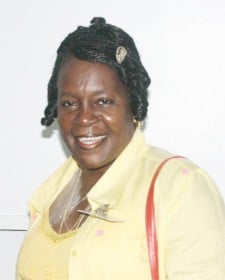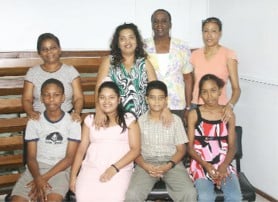For the thirteen pre-secondary children who participated in the inaugural programme of Manners Matter, a one-week summer orientation exercise run by the Visions of Excellence Resource Development Centre, the time could hardly have been better spent. In just a few days they were reminded through a series of practical group exercises that manners really do matter, that personal development goes well beyond academic achievement and that effective socialization is as much about what you are as who you are.

Manners Matter, a programme conceptualized by Jackie Ault, a Founder and Director of Visions of Excellence, seeks Ault says, “to provide young people with a doorway to the acquisition of refined behaviour patterns and skills and positive social habits. The concept behind the programme is simple. It is about helping young people to cultivate skills and habits that will serve them in good stead for the rest of their lives. We want to make the point, through the children, that there is really nothing wrong with well-mannered, well-rounded young people who possess the social and communication skills that are so necessary if they are to do well both here in Guyana and in the wider world.”
During the one-week programme the children were oriented in positive social habits ranging from a mindfulness of refined dining skills and ‘table manners’ to the benefits of effective verbal communication skills and of working together to “think through issues” and to resolve problems.
Much of the programme was focused on a group approach to learning the skills that were

offered and Ault says that she was particularly pleased that the exercise also helped to form bonds of friendship among the participant that will probably last for a long time. “Making new friends and acquaintances and learning to work together, understanding how to tackle problems and negotiate resolution of those problems are skills that have actually helped to settle diffferences between and among states and I believe that they can have the same results in conflicts between and among young people. Think of how much better an environment we can create within the school system if we can teach children to become competent in approaches to conflict resolution that are pursued in a less than confrontational setting,” Ault, a retired diplomat says.
“While we are not suggesting that some or even all of these skills and practices are not being taught in many homes, Visions of Excellence believes that children reach a stage in their lives where imminent exposure to new environments and new social encounters and experiences means that those skills and practices need to be re-enforced and refined through practical exposure to training that goes beyond the home. We are essentially helping them to cope with what I believe are the considerable responsibilities and challenges that will confront them as they enter the adult world.”
The skill of clear and effective delivery of the spoken word, one of the key elements of the programme, sought to teach participants that while parochial language forms are an acceptable part of the Guyanese social culture, proper speech provides a gateway to the kind of effective universal communication in which the children will be expected to engage during their experiences at the level of school as well as in the wider society. “We tried to make the point to parents that Visions of Excellence can help their children realise some of the expectations which they, the parents, have of their children and the feedback that we have received from both the participants and the parents suggests that we have made some headway in that direction,” Ault says.
She believes, she says, that “a less than efficient command of the spoken word is a deficiency that is all too common among both children and adults. A command of language can be a tremendous confidence builder in addition to which it is also a credential that serves as a recommendation in several situations.”
The group, most of whom are preparing to enter secondary school, demonstrates a keenness to continually refine the skills they have learnt through practice and Ault says that she is not through with them yet. She plans to work with them in various social settings, dining with them, placing them in conversational environments that encourage them to practice their language skills and making them examples which she hopes other parents will want their children to follow. Dr. Hazel Smith, a US-based Guyanese Special Needs Educator who served as one of two facilitators for the programme says that she particularly valued the opportunity which the programme afforded her to contribute to the development of critical skills in school-aged children. Dr. Smith, a specialist in Special Needs Education delivery who once taught in the local education system and is currently contemplating remigration, says that the verbal language skills component of Manners Matter was particularly relevant since it was important that Guyanese children cultivate a fluency in the verbalization of their thoughts. She says that while local creole language forms have their place in communication settings, the requirement of communicating with global audiences dictates that children learn to deliver themselves in standard English.
Ault says that the children have responded with much enthusiasm to the communication skills aspect of the programme. “They particularly enjoy encouraging their parents to become part of the new-found speech patterns and have ‘taken to’ the code switch mechanism which Dr. Smith brought to the programme and which provides a signal that a particular social setting requires the use of more refined verbal communication.
Those parents with whom The Guyana Review spoke during an exercise designed to review the benefits of the programme say that apart from the role which the programme has played in helping to “build confidence” within their children, it has also helped them to refine their interpersonal communication skills and to work with their peers. “We believe that the programme helped us to understand more clearly the various duties that we have in the process of bringing up our children,” one parent says.
Ault says that the success of the inaugural programme of Manners Matter has been an important boost for Visions of Excellence since. “Apart from the fact that it encourages us to try to reach even more parents and children, the success has set us thinking in terms of other directions in which we can go to support the efforts of both children and adults to better their lives.”
“Without naming any of the agencies I also want to say how really very pleased we were to receive the level of support from the private sector that we did. It is comforting to know that there are businesses in the private sector that are prepared to invest in initiatives which, at the end of the day, have to do with things that are no less important than business and entrepreneurship.”





